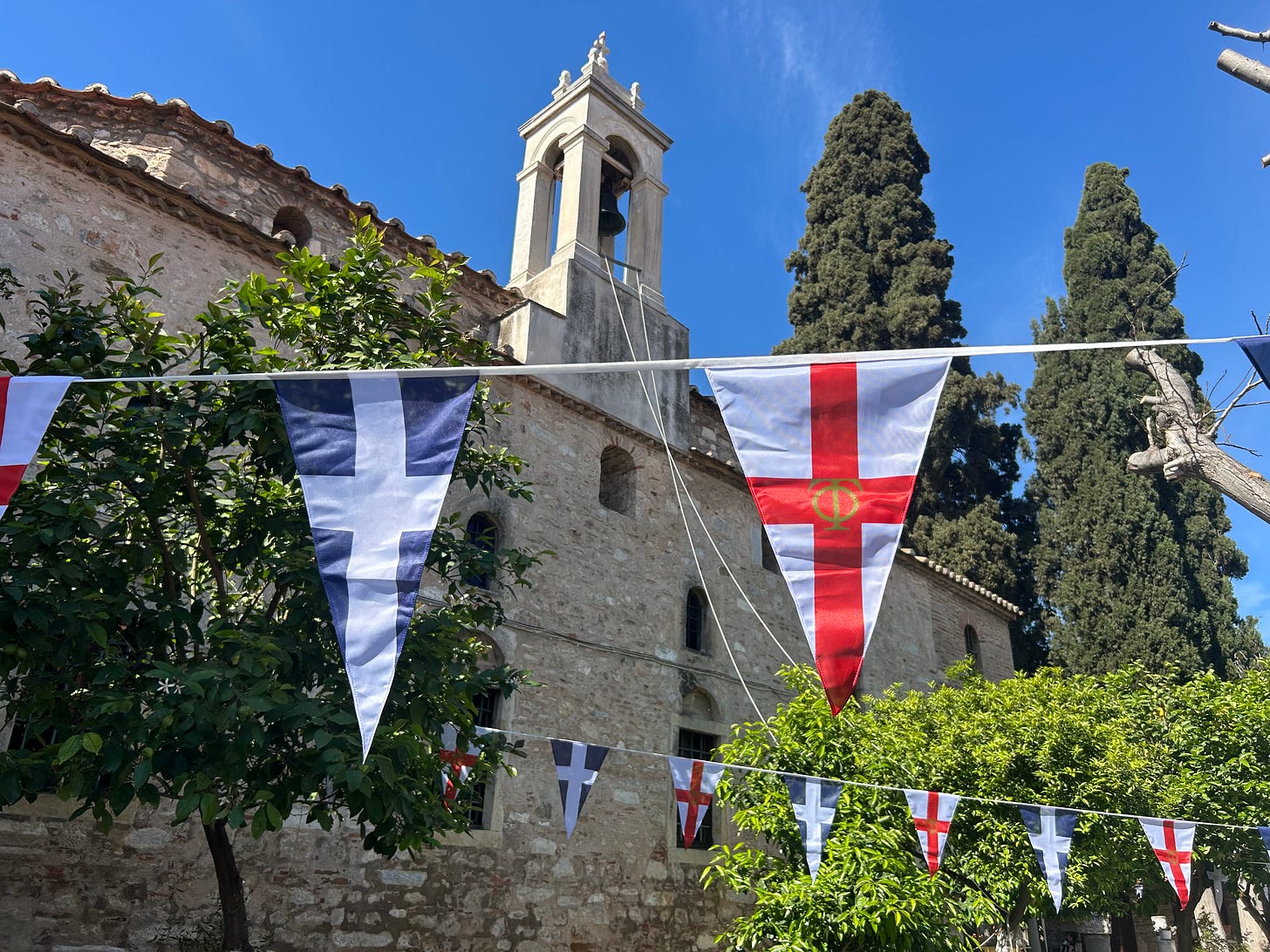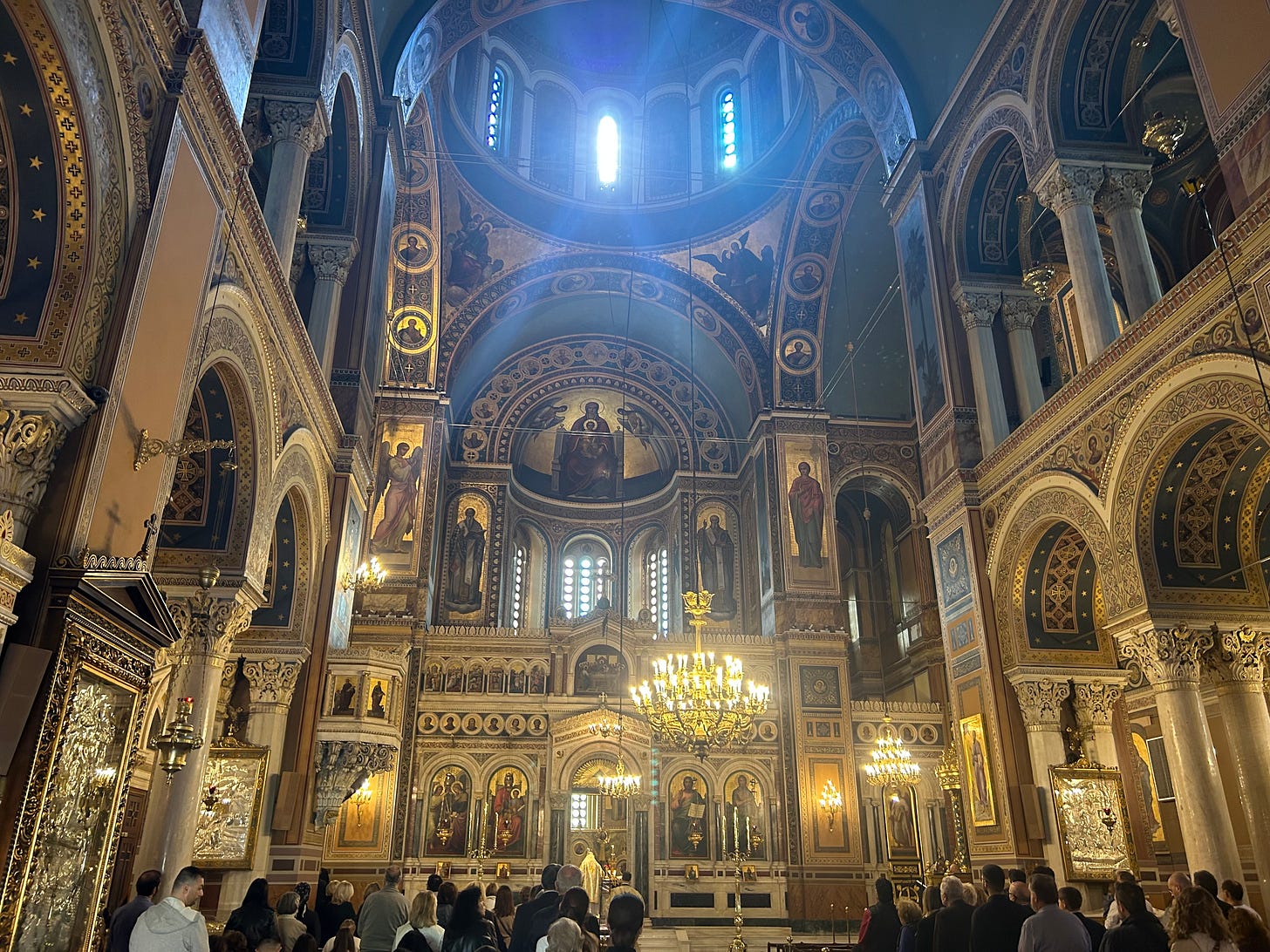A First Experience of Orthodox Easter in Greece
For the first time, I got to experience the timeless customs of Easter in Greece, which are nothing less than truly unique, deeply stirring and incredibly intricate
In the Greek Orthodox calendar, Easter or Πάσχα (Pascha) is the most important and most sacred festival of the year – much more so than Christmas. The age-old traditions that define Easter in Greece are equally significant. Taking place throughout the Holy Week, Greek Easter customs range from fasting to lamb-on-the-spit, candles to fireworks and red eggs to elaborately decorated epitaphs.
From an outside perspective, the spectacle of Greek Easter is simultaneously sobering and stunning. Since a young age, learning the Greek language lent me an awareness of these traditions. Although I had learnt about the events of Holy Week, including the τσούγκρισμα (tsougrisma, cracking of red eggs) and midnight ανάσταση (anastasi, resurrection), I had never experienced these customs first-hand. Whilst these celebrations are second-nature to all Greeks, this year I had the opportunity and privilege to spend Easter in Greece for the first time.
And, of course, whilst many Athenians head to the islands or their family villages for Easter, I stayed in an area of Athens I know well. Agia Paraskevi is an attractive yet decidedly understated locale on the slopes of Mount Ymittos. I stayed here during my first time living in Athens in 2023, so it holds a special place in my heart as one of my many ‘second homes’. For me, there was no better place to familiarise myself with Greek Easter.
Good Friday
On the evening of Μεγάλη Παρασκευή (Good Friday), I arrived in Athens just in time to witness one of the most well-known of all Easter traditions – the processions. In Greece, such processions always feature an elaborately decorated epitaph adorned with colourful flowers that symbolises the tomb of Christ. The epitaph is decorated on the morning of Good Friday, before being carried around the neighbourhood at around 9pm in the evening in an act designed to resemble the funeral procession of Christ.
For me, the most striking part of the procession was the sense of all-encompassing emotion across an entire community, with people of all ages coming together in a single moment of solemnity, harmony and hope. At the church of Profitis Ilias in Agia Paraskevi, I visited the beautiful epitaph. After lining up slowly to approach the epitaph laid out in the centre, I was able to join others in gently kissing the embroidered cloth. The sombre atmosphere, coupled with the breathtakingly intricate paintings of icons on the interior walls of the building, created a deeply spiritual but also cultural and communal moment.
Holy Saturday
After the solemnity of the previous evening, Holy Saturday begins with a hope of the forthcoming resurrection.
I travelled to the centre of the city to see the preparations taking place at the Metropolitan Cathedral in central Athens, where candles were being lit and services held. For many Greeks, this day is spent in preparation for the climax of Holy Week celebrations, the resurrection of Christ and the end of Lent. Lent in Greek begins following the απόκριες – a word meaning ‘from meat’ that symbolises the beginning of Lent. However, the fasting becomes especially serious between Holy Thursday and the Resurrection. “I’ve only eaten an apple!”, my friend told me.
Meanwhile, the holy flame is flown in from Jerusalem to Athens before being immediately distributed to churches in cities, villages and islands throughout Greece – arriving just in time for the midnight service. The flame arrives in Athens at around 7pm, leaving only five hours for distribution by car, plane and boat. In fact, Aegean Airlines and Olympic Air schedule special flights to transport the flame to islands such as Kefalonia, Samos and Kos, whilst using existing flights to transport the flame to cities such as Thessaloniki or Ioannina. This network demonstrates the logistical complexities of such an operation, which has been perfected over many years.

After meeting with some friends and enjoying some sweet Easter tsourekia, I prepared for the resurrection service, which would take place at midnight. As a focal point of Greek culture and the Orthodox calendar, this service represents the moment when mourning transforms into celebration. At 11.30pm, Greeks of all ages make their way to their local Church in preparation for the moment of Christ’s resurrection at midnight. The atmosphere is one of intense anticipation, as smartly-dressed Athenians meet and greet each other, sharing the emotional power of the moment with friends and family. Every person holds their λάμπαδα (an Easter candle), ranging from simple white to elaborately decorated expressions of personality, patiently waiting for midnight to arrive.
As the clock approaches midnight, the crowd begins to silence and the lights darken before the Priest emerges with the holy flame (Άγιο Φώς). Almost immediately, the flame is passed from person to person amongst the huge crowd, in a truly communal moment. Within seconds, the crowd of people was illuminated by candlelight in preparation for the climax. As bells ring out and fireworks are launched around the city, the celebration has truly begun. In this moment of happiness, families and friends exchange greetings, echoing “Χρόνια Πολλά” and “Χριστός Ανέστη” (Christ is risen), before replying “Αληθώς ο Κύριος” (Truly, he has risen).You can watch the culmination of this moment of resurrection at the Church of Profitis Ilias in Agia Paraskevi here.

For me, as a first-timer, this experience was deeply stirring. The variety of emotions, the participatory act of spreading the holy flame and the sense of community made this midnight service an incredibly poignant moment. I was so glad to have spent it in a place so close to my heart. Moments after the celebration, the crowd dispersed to return to their houses, carefully guarding their holy flame as they walk (or drive) home. Upon their return, the holy flame is used to bless the home in a cross above the door frame, before the fast is broken with the traditional magiritsa soup.
Just like with the processions of the epitaph, islands across Greece have their own traditions at the moment of resurrection. These unique customs range from exchanging fireworks between villages across the valley in Chios and dropping red vases from balconies in Corfu Town to mark the first resurrection to fusing Catholic and Orthodox traditions on the island of Syros. Wherever you are, however, this moment is pervasive in the best possible way, bringing together every member of the community in ritualistic celebration.
Easter Sunday
The excitement of the night before gives way to a more relaxed joy and happiness, as Easter Sunday begins slowly. Easter Sunday is a day for families to come together, enjoying a feast of lamb. I began the day with more tsoureki. Again, celebratory greetings filled the air, along with the aroma of lamb on the spit. Across the entire country in gardens, on balconies and at the side of the road, the lamb is cooked from early in the morning until the late afternoon. The dinner table is often dressed with dyed, decorated red eggs, in preparation for the infamous game of ‘cracking’. Leaving Athens behind as I travelled to Crete, the Easter celebrations continued even at the airport, as I was handed a chocolate red egg with instructions on how to ‘win’ this game of fortune.
For visitors and those eager to witness one of the most important moments of Greek culture, Easter can be an enriching time to travel to Greece, although you must be prepared to act respectfully and with the knowledge that tavernas, shops and restaurants may well be closed in favour of family togetherness. As a first-timer of Greek Easter, I found the experience truly moving, with the knowledge that the spectacle of these traditions had been playing out ceremoniously for thousands of years. Whilst I was honoured to be able to spend Easter in my Athenian home-away-from-home, it is customary for most Greeks to return to their ancestral island or village at Easter. Bearing my already nostalgic experience of Greek Easter in mind, I cannot wait to explore the unique traditions of other places in Greece in the future.










A beautiful account of the Easter traditions!